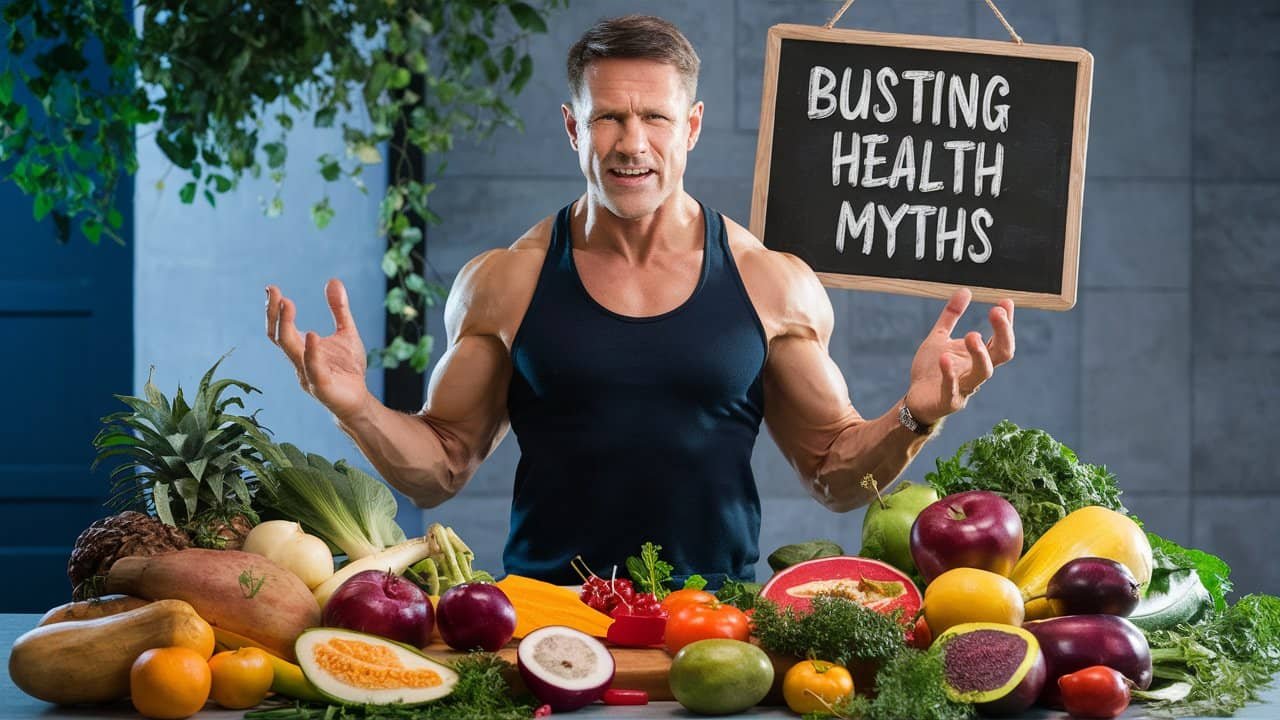25 Myth-Busting Insights for Better Health and Nutrition
Discover easy tips and Surprising Truths about food that can help you stay healthy and happy.

Have you ever thought that some of the nutrition advice you’ve heard might actually be wrong? Chris Boettcher, who’s both a physical therapist and an Ironman champion, has some interesting ideas about food and health. He’s done 10 Ironman races, so he knows a thing or two about staying fit.
The food you eat does more than just fill you up. But here’s the thing: some of the food rules we often hear about might not be as helpful as we think.
In this article, we’re going to look at some health facts that many doctors and nutritionists don’t often talk about or falsely demonize.
1. Nutrient Powerhouses: Meat, Eggs, and Animal Organs
Meat, eggs, and animal organs are some of the most nutritious foods you can eat. These foods are full of high-quality proteins, essential fats, vitamins, and minerals.
For example, liver is rich in vitamin A, B vitamins, and iron, which help keep your energy up and support your immune system. [1]
Eggs are really good for your brain because they have a lot of choline in them. They also have complete proteins. For instance, just one large egg has 164mg of choline, which is about 30-38% of what adults should get each day. [2]
Adding these foods to your meals can boost your overall nutrition intake without sacrificing taste. They’re flexible, easy to prepare and can be used in many recipes.
2. Bone Broth: Collagen-Rich Gut Healer

Adding bone broth to your diet can boost your nutrition by giving you collagen, which helps keep your gut healthy and heals it from the inside.
According to renowned Dr. Axe, Bone broth has important amino acids that fix your gut lining, which is great for people with stomach problems. It also has minerals like calcium, magnesium, and phosphorus that are good for strong bones and overall health.
To get these benefits, try drinking warm bone broth or using it in soups and stews. You can make it at home by simmering bones for several hours, or you can buy it ready-made.
3. Heart Disease Linked to Insulin Resistance, Not Saturated Fat
Recent research shows that insulin resistance, not saturated fat, is a key factor in heart disease.
More specifically, a 2010 article published in the journal “Lipids” concluded that cutting saturated fats alone may not improve heart health. Replacing them with polyunsaturated fats can reduce heart disease risk, but swapping them for carbs or monounsaturated fats has unclear benefits. The impact on other health issues like diabetes and stroke is still uncertain.
Another 2018 review published in “Cardiovascular Diabetology” concluded that insulin resistance, which disrupts glucose and lipid metabolism, leads to heart disease. It causes high blood sugar, oxidative stress, inflammation, and abnormal lipid levels, contributing to heart damage and plaque buildup. New treatments targeting insulin resistance could reduce heart disease and plaque formation.
Finally, a 2015 article published in the journal Practical Diabetes by Dr. Trudi Deakin and Dr. Leoni Garden, concluded that there is no clear link between saturated fat intake and heart disease risk. The authors state more research is needed to determine if saturated fats have any effect on cardiovascular health[1].
Having said that, if your body manages insulin properly, eating saturated fat won’t automatically raise your heart disease risk. Therefore, it’s crucial to keep your blood sugar steady by eating a balanced diet full of whole foods, fiber, and low-sugar carbs. Regular exercise and staying at a healthy weight also help improve how your body uses insulin.
By focusing on insulin resistance, you address the real issue and can make better food choices without worrying too much about saturated fat.
4. Triglycerides to HDL Ratio: A Key Mortality Indicator
Understanding how your triglycerides to HDL ratio affects your health can help you make better choices for a healthier life. This ratio measures the amount of triglycerides, a type of fat in your blood, compared to HDL, or good cholesterol.
A lower ratio means you’re likely healthier and less at risk for heart problems.
Think of it like a balance scale; having fewer triglycerides means less strain on your heart and arteries.
Regularly checking this ratio through blood tests can help you decide what to eat and how to live. Focus on foods that are rich in healthy fats and fiber, and stay active to keep this important health measure in check.
5. Protein: Metabolically Active Macronutrient
Protein is an important part of your diet and helps your body use energy. It takes more energy to digest protein than fats or carbs, so your body burns more calories when breaking down protein. This is often called the thermic effect of food or Diet induced thermogenesis. [3] [4]
Some people worry that eating a lot of protein can hurt their kidneys, but according to Precision Nutrition show this isn’t true for healthy people. Eating a normal amount of protein doesn’t harm your kidneys, just like driving a car safely doesn’t hurt the car.
Adding enough protein to your diet can support your overall health, help maintain your muscles, and boost your metabolism. This makes it an essential part of your nutrition plan.
Natural sources of protein, like beans, nuts, chicken, beef and seeds, can be especially beneficial.
Cottage cheese and Greek yogurt are two of the best protein sources, offering important nutrients for your diet. Cottage cheese has about 11-15 grams of protein per 100 grams. A 100-gram serving of 2% cottage cheese has around 84 calories, with half coming from protein. [5]
Greek yogurt offers around 10 grams of protein per 100 grams, depending on the brand and fat content. Adding these dairy foods to your meals can help you get enough protein and also give you important vitamins and minerals for good health. [6]
Also, Enzymes can help your body absorb more protein by breaking it down faster and more effective. One of the best Enzyme Supplements is MassZymes.
MassZymes 3.0 Enzymes
THE STRONGEST ENZYME FORMULA EVER: MassZymes (full review) is a full-spectrum enzyme formula with more protease than any other commercially available, with 5 different kinds of protease.
Plus, it contains all the other key enzymes you need for optimal digestion.

6. Dietary Cholesterol Myth
Many people wrongly believe that eating foods like eggs and meat increases blood cholesterol levels a lot. But research shows this isn’t true. Studies say that dietary cholesterol hardly affects your blood cholesterol. Your body mainly controls cholesterol through its own production.
For example, a 2011 Japanese study published in the Journal of Epidemiology. found that low cholesterol levels were linked to higher mortality rates in both men and women, even after excluding liver disease deaths. High cholesterol was not a risk factor. Low cholesterol was particularly associated with higher deaths from hemorrhagic stroke, heart failure, and cancer.
Another research by Swedish scientists found that high LDL cholesterol (LDL-C) was inversely associated with mortality in most people over 60. This contradicts the cholesterol hypothesis, which claims LDL-C is harmful. The study suggests elderly people with high LDL-C live as long or longer than those with low LDL-C, questioning current guidelines on lowering LDL-C for heart disease prevention.
Of course, the British Heart Foundation attempted to debunk the study but was unsuccessful. It seems the slogan ‘trust the science’ is used selectively, depending on what suits us best.
So, eating eggs or lean meats won’t automatically harm your health. Instead, focus on your overall eating habits, including foods rich in fiber, healthy fats, and getting regular exercise.
It’s easier and more helpful to eat whole foods and have balanced nutrition to stay healthy, rather than just worrying about cholesterol numbers.
7. Walk for Better Digestion

Taking a walk before and after meals can really help your digestion and keep your blood sugar levels steady. Walking gets your body moving, which helps food go through your stomach and intestines better. It’s like stirring a pot; the movement helps mix and process everything evenly. [7]
Also, walking after eating can help lower blood sugar spikes, especially after eating sugary or high-carb foods. When you walk, your body uses some of that extra sugar, which helps keep your blood sugar stable.
8. Fiber and Digestive Issues
Fiber can be tricky for those dealing with digestive issues like IBS or diverticulitis, as it may actually worsen symptoms rather than help.
- For individuals with IBS (irritable bowel syndrome), high-fiber foods can lead to increased gas and bloating, making discomfort more pronounced. (Check also: List With 26 Best Foods for Irritable Bowel Syndrome And Foods To Avoid)
- In cases of diverticulitis, consuming too much fiber can irritate inflamed pouches, intensifying pain and complicating recovery.
If you have these conditions, you might want to take a tailored approach to fiber intake. Consider starting with low-fiber options and slowly introducing soluble fiber, like oatmeal or bananas, which may be easier on your digestive system.
9. Profit-Driven Nutritional Advice

Profit-driven nutritional advice often puts corporate interests ahead of your health, leading to tips that mightn’t actually help you. Many food guidelines are designed to boost profits, not make you healthier.
Look at sugary cereals, for instance. They’re advertised as healthy breakfast options because of their bright boxes and fun characters. But their high sugar content can hurt your health, showing how companies put profits over good advice. They make money, while you might end up eating foods that don’t match your health goals.
To deal with this, focus on whole, minimally processed foods and be skeptical of popular choices that seem more about marketing than real nutrition. It’s important to put your health first, even if it means going against corporate agendas.
10. Not All Calories Are Equal
Not all calories affect your body the same way, so knowing the difference can help you make better food choices for your health.
For example, calories from sugar and refined grains can make you feel hungry because they cause quick changes in your blood sugar levels. This can make you eat more, which isn’t good if you’re trying to manage your weight. [6]
On the other hand, foods high in protein, like chicken, fish, beans, and nuts, keep you full longer. They take more energy to digest, which means your body burns more calories even after you eat.
By eating more protein, you not only feel fuller but also help your metabolism, making it easier to stick to your health goals.
11. Multi Grain Means More Junk
That’s what Chris Boettcher says – and I believe him.
Choosing multi-grain products might seem like a healthy choice, but they often mix together different low-quality grains that don’t give you much nutritional value.
Many brands label their items as ‘multi-grain,’ but these grains can be processed, refined, or missing important nutrients. Instead of giving balanced nutrition, they can add more carbs without the fiber, vitamins, and minerals your body needs.
To make better choices, read the ingredient list carefully. Look for whole grains like quinoa, brown rice, buckwheat or oats as the main ingredients, not just fillers.
12. Avoid Sugary Breakfasts
Starting your day with sugary breakfasts like cereal or bread can make your blood sugar go up very quickly, leaving you hungry before lunch.
Both cereal and bread have a lot of carbs, which your body turns into sugar fast, causing that quick rise in blood sugar levels. This spike isn’t just annoying; it can make you feel tired and wanting more food soon after.
Instead, think about choosing options like Greek yogurt or eggs. These foods have lots of protein and healthy fats, giving you steady energy and keeping you full all morning.
13. Intuitive Eating Is Misleading
While the idea of intuitive eating encourages listening to your body’s signals, it’s important to understand that many people have issues with their metabolism and food addiction. This can mess up their natural hunger cues.
In fact, about 88% of people have metabolic problems, making it hard for them to know what their bodies really need. This mix-up can lead to eating too much or too little, as cravings can take over real hunger. [8]
Just following your intuition without knowing about these problems mightn’t be the best plan. Instead, try combining intuitive eating with knowledge about nutrition and healthy eating habits.
Setting regular meal times and making informed food choices can be a better way to improve your health.
14. Less Frequent Eating Benefits Health
Eating less often can greatly benefit your health by giving your body more time to rest and recover between meals. This can help improve digestion and energy levels.
When you eat, your body works hard to digest the food, and doing this too often can lead to wasted energy. By cutting down on how often you eat, you give your digestive system a break, making it work better.
Instead of always digesting three big meals, your body can use the energy from two or even one meal more effectively.
So, is it time to consider intermittent fasting?
15. Simple Cooking for Consistency

Cooking simple and consistent meals can make your meal prep easier, helping you stick to a healthy diet without needing fancy recipes or special cooking skills.
You don’t need to be a top chef; just grill some meat, cook a green vegetable in a pan, bake a potato, or boil an egg. These basic methods are easy to learn and can give you many healthy choices.
Mixing these basics lets you make meals you like without getting stressed. Eating the same foods every week mightn’t be perfect, but it helps you stay consistent, which is important for success.
Simplifying how you cook not only saves time but also supports better health choices over the long run.
16. Focus on Insulin Sensitivity
Improving your insulin sensitivity is important for helping your body use glucose better and manage energy, which can lead to better health.
According to Cleveland clinic, when your body is more sensitive to insulin, your cells can use glucose more effectively, which lowers the risk of type 2 diabetes and metabolic issues.
To do this, focus on eating a balanced diet with natural foods, like fruits, vegetables, and whole grains. Try to eat more fiber, healthy fats, and lean proteins, while cutting down on processed sugars and refined carbs.
Regular exercise is also very important for boosting insulin sensitivity. Aim to do both aerobic exercises, like jogging or cycling, and strength training, like lifting weights or doing yoga.
These simple changes can help you manage your weight, feel more energetic, and live a longer, healthier life.
17. Avoid Unhealthy Salad Dressings
Many popular salad dressings are filled with unhealthy ingredients that can ruin your health goals. They often hide extra calories and bad oils in what should be a healthy meal.
Many store-bought dressings have high fructose corn syrup, artificial flavors, and preservatives, all of which can harm your well-being.
For better choices, try using olive oil, balsamic vinegar, or homemade dressings with fresh herbs and spices.
This way, you know exactly what’s in your dressing and can avoid unwanted chemicals. By switching to healthier dressings, you can improve taste without hurting your health, making your salad truly good for you.
18. Frequent Eating Won’t Boost Metabolism
Eating more frequently throughout the day won’t necessarily speed up your metabolism, so it’s more important to focus on your overall calorie intake and nutrient balance instead.
Research shows that eating five times a day doesn’t significantly affect your resting metabolic rate or the calories you burn at rest. Instead, things like your body size, muscle mass, age, and genes play a bigger role in your metabolism.
While some nutrients might slightly boost your metabolism, how often you eat doesn’t make losing weight easier for most people. You should focus on your total calorie intake and making sure you get a good balance of nutrients throughout the day, rather than worrying about when or how often you eat.
19. Health at Any Size Myth
The idea that you can be healthy at any size goes against a lot of evidence that shows extra weight is linked to many health problems. This challenges what the Health at Every Size (HAES) movement says.
While HAES supporters believe you shouldn’t judge health based on body size, many studies show a clear link between being overweight and issues like diabetes, heart disease, and high blood pressure.
Feeling good about yourself is important, but ignoring the health risks that come with extra weight isn’t realistic.
Adopting a healthier lifestyle often means eating better and being more active. Understanding the facts can help you make better choices for your health.
20. Meal Prep Ensures Success
Preparing meals ahead of time can really help you stick to a healthy diet. When you take the time to meal prep, you avoid the temptation of fast, unhealthy food.
You can plan balanced meals that include the right proteins, carbs, and fats. By keeping ready-to-eat protein sources on hand, you make sure that healthy choices are always available, helping you stay on track.
Studies show that good meal planning reduces stress and encourages better eating habits, making it easier to avoid bad decisions. Plus, you save time during the week, giving you more chances for exercise or relaxation. [9]
Stick to a meal prep routine, and you’ll improve your chances of staying healthy in the long run. Embracing natural and alternative health practices like meal prepping can make a big difference in your life.
21. Food Impacts Mental Health
What you choose to eat can have a big impact on your mental health. Studies show a strong link between what you eat and issues like depression and anxiety. [10]
Eating a lot of processed foods, which are often made to be addictive, can make mental health problems worse. [11]
These foods can cause your blood sugar to spike, leading to mood swings and irritability.
Instead, try to eat more natural foods. Including fruits, vegetables, whole grains, and healthy fats in your diet can help your brain and improve your mood.
You can even change your taste buds over time by slowly replacing processed foods with healthier options. Choosing the right foods is key for both your physical and mental health, so make smart choices for a healthier mind.
22. Plant-Based Foods Are Overpriced Junk

Many people don’t realize that ‘plant-based’ foods are often made in labs to make money rather than to be healthy.
These products are usually heavily processed, full of additives, and have long ingredient lists that don’t look like real food. [12]
Even though ads say they’re good for you, many of these foods don’t actually provide much nutrition. You might be paying more for these items, but they aren’t much better than regular animal-based foods.
Instead of choosing these expensive, processed options, try adding whole, unprocessed plant foods like fruits, vegetables, beans, and grains to your diet. These choices aren’t only healthier but also often cheaper and easier to find.
23. Gut Health and Immune System
Your gut is super important for your immune health because it holds about 70% of your immune system. [13]
So, it’s really important to feed it the right foods. Eating too much sugar and junk food can mess up your gut and weaken your immune system. Instead, you should eat lots of fruits, vegetables, and whole grains, which are full of fiber and help keep your gut bacteria healthy.
Foods like yogurt and other fermented foods have probiotics that can also improve your gut health and boost your immune system. Try to avoid processed foods and stick to natural ingredients. This helps keep your gut strong.
Drinking plenty of water every day is also important for staying hydrated and keeping your gut healthy. By taking care of your gut now, you’re not only feeling better today but also protecting your immune system for the future.
Conclusion
The truth is, a lot of what we’ve been told about eating healthy might be wrong. Big food companies and even some health experts have been pushing ideas that sound good but don’t always help us.
Things like avoiding fat, eating many small meals a day, or thinking all plant-based foods are automatically healthy – these might not be as good for us as we thought.
It’s time to take a hard look at what we eat and why. Don’t just follow the crowd or believe everything you hear about nutrition.
Be willing to question common beliefs about food and health.
You Might Also Like

